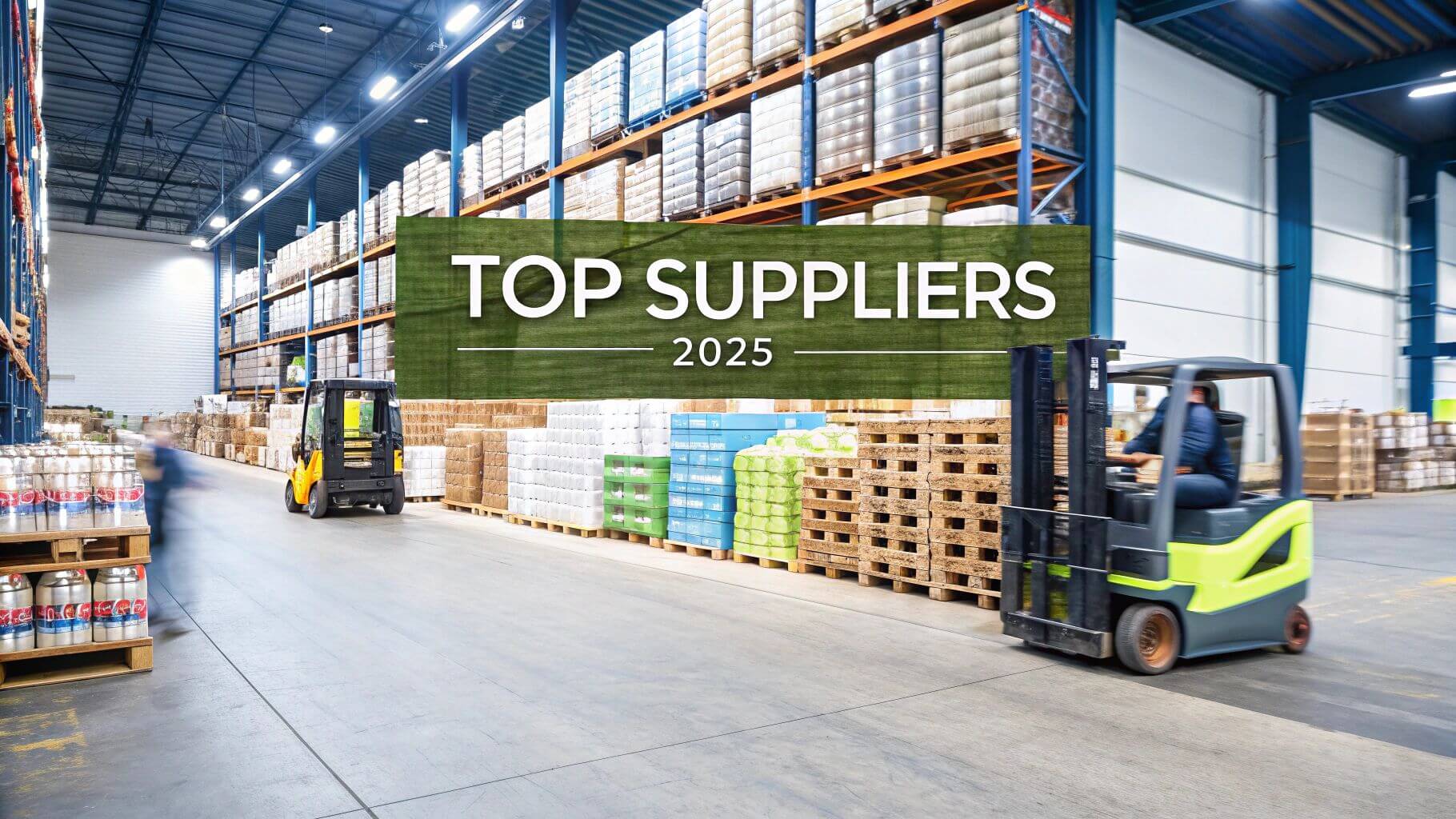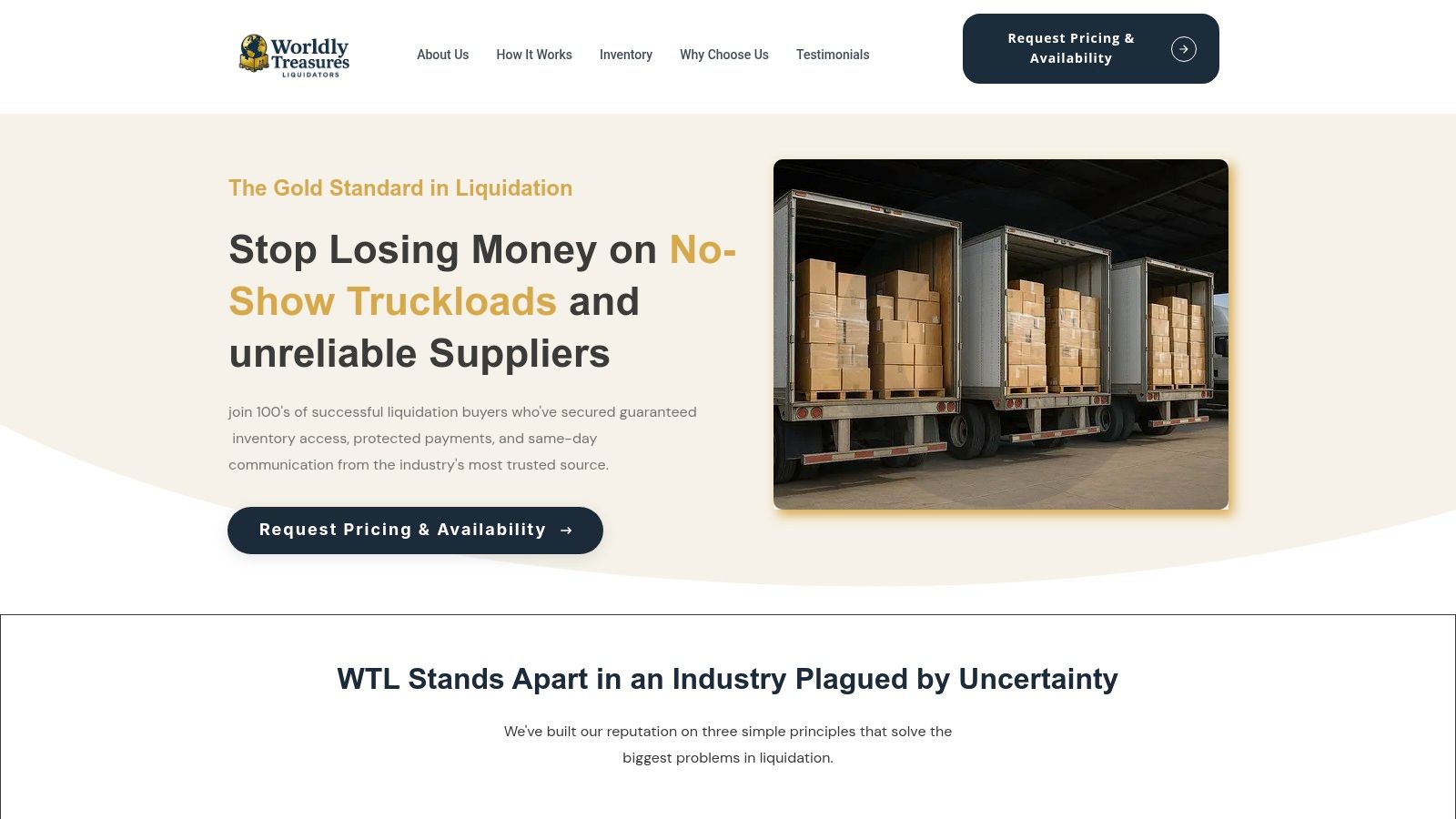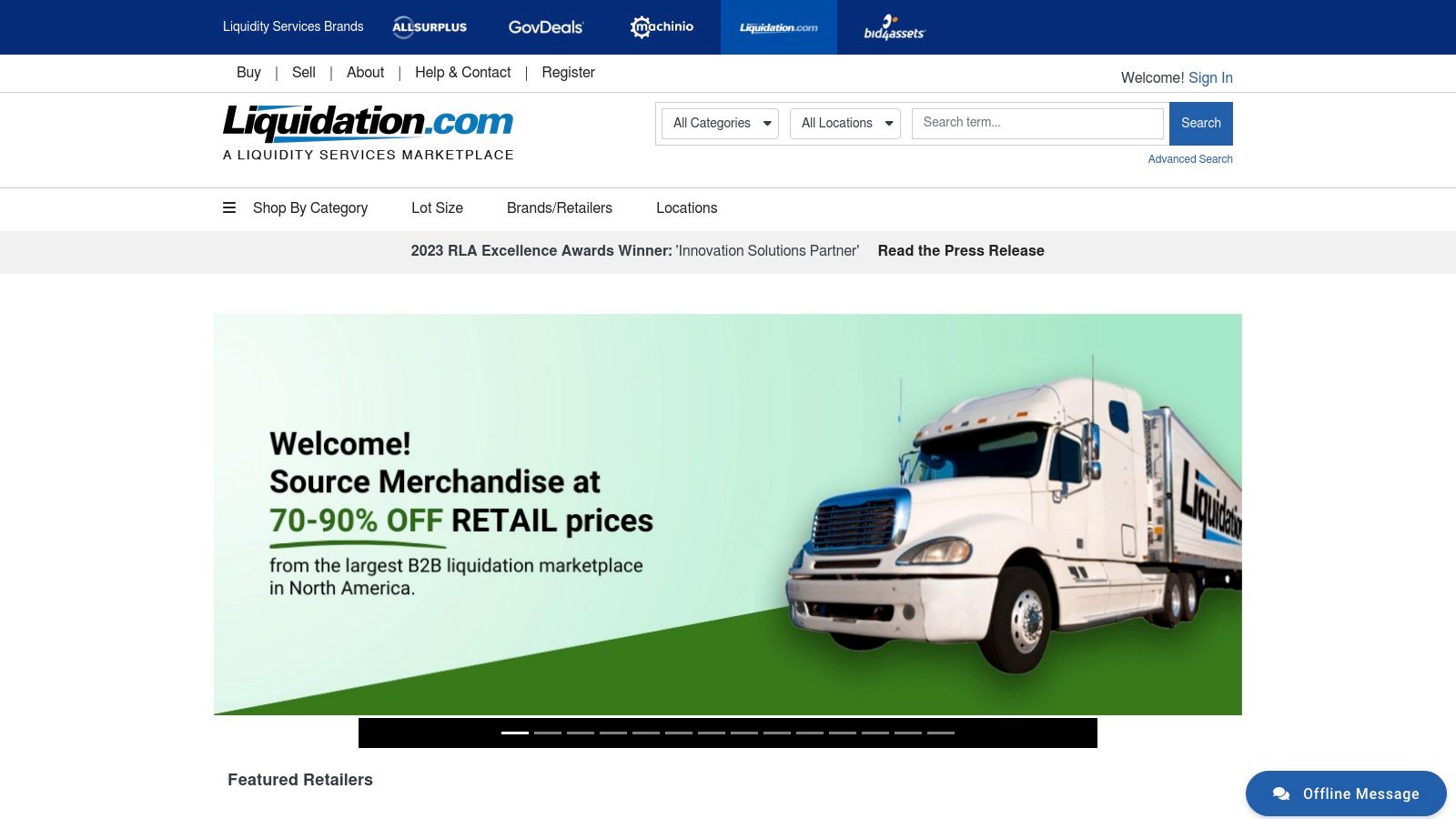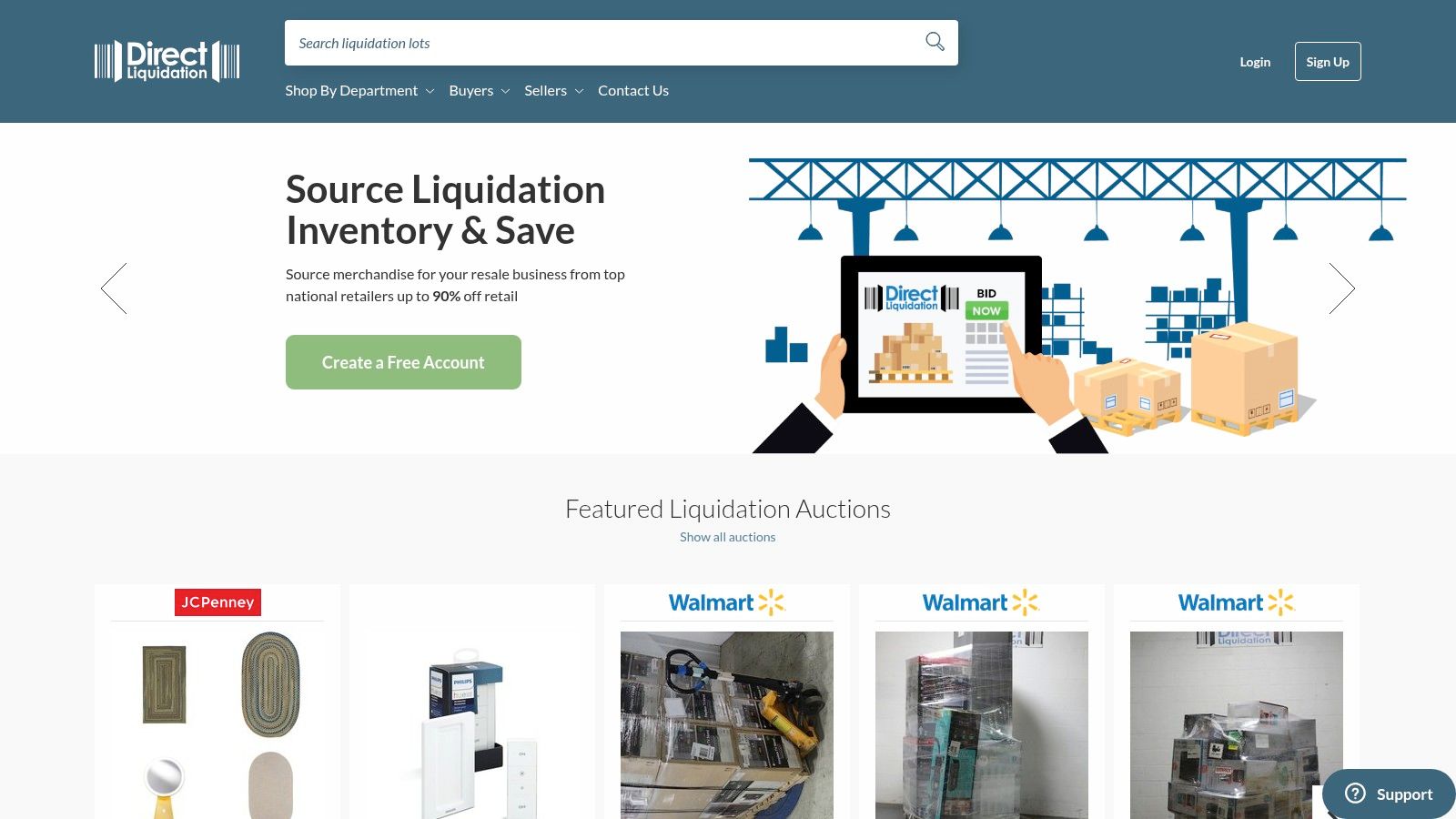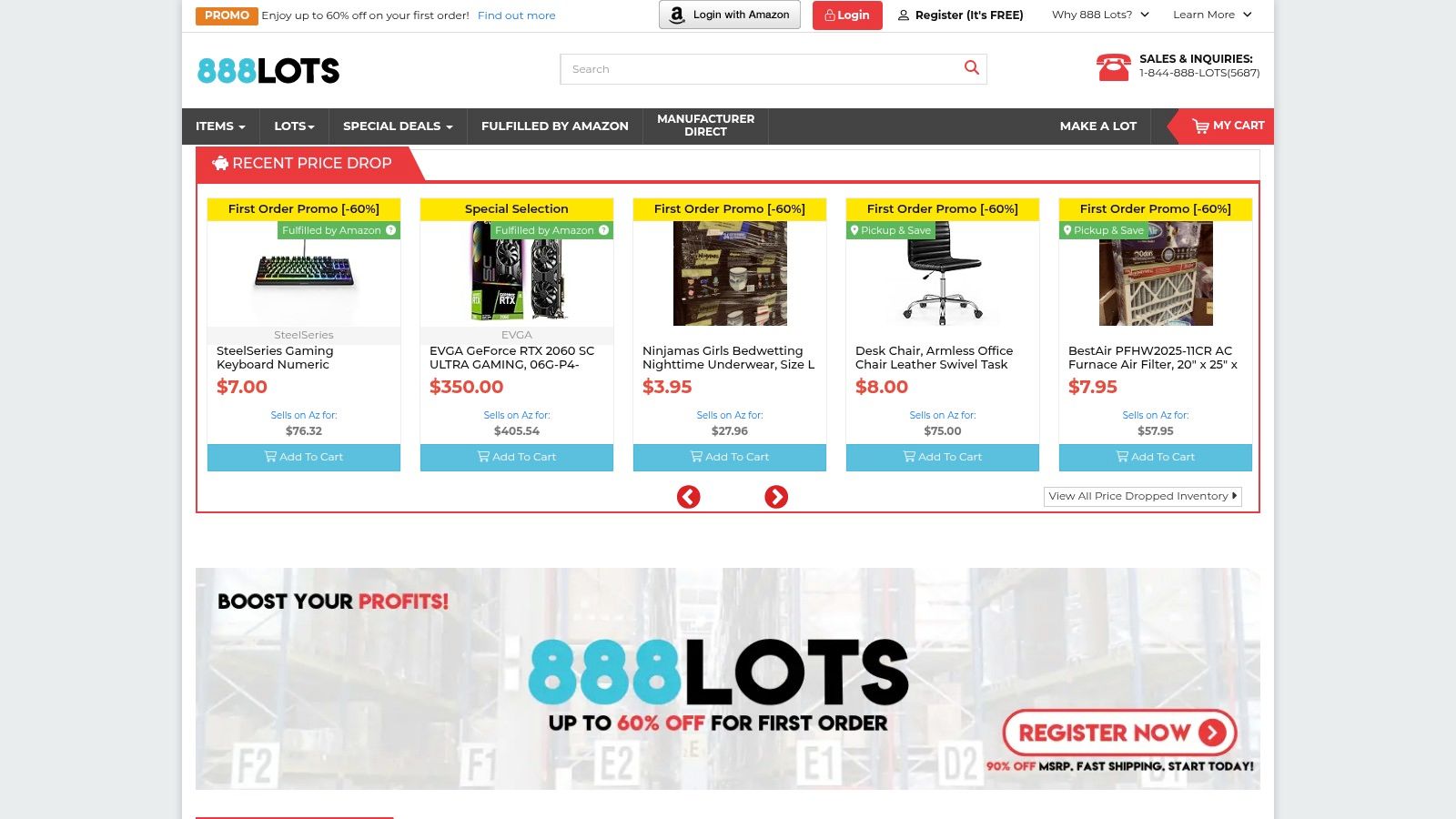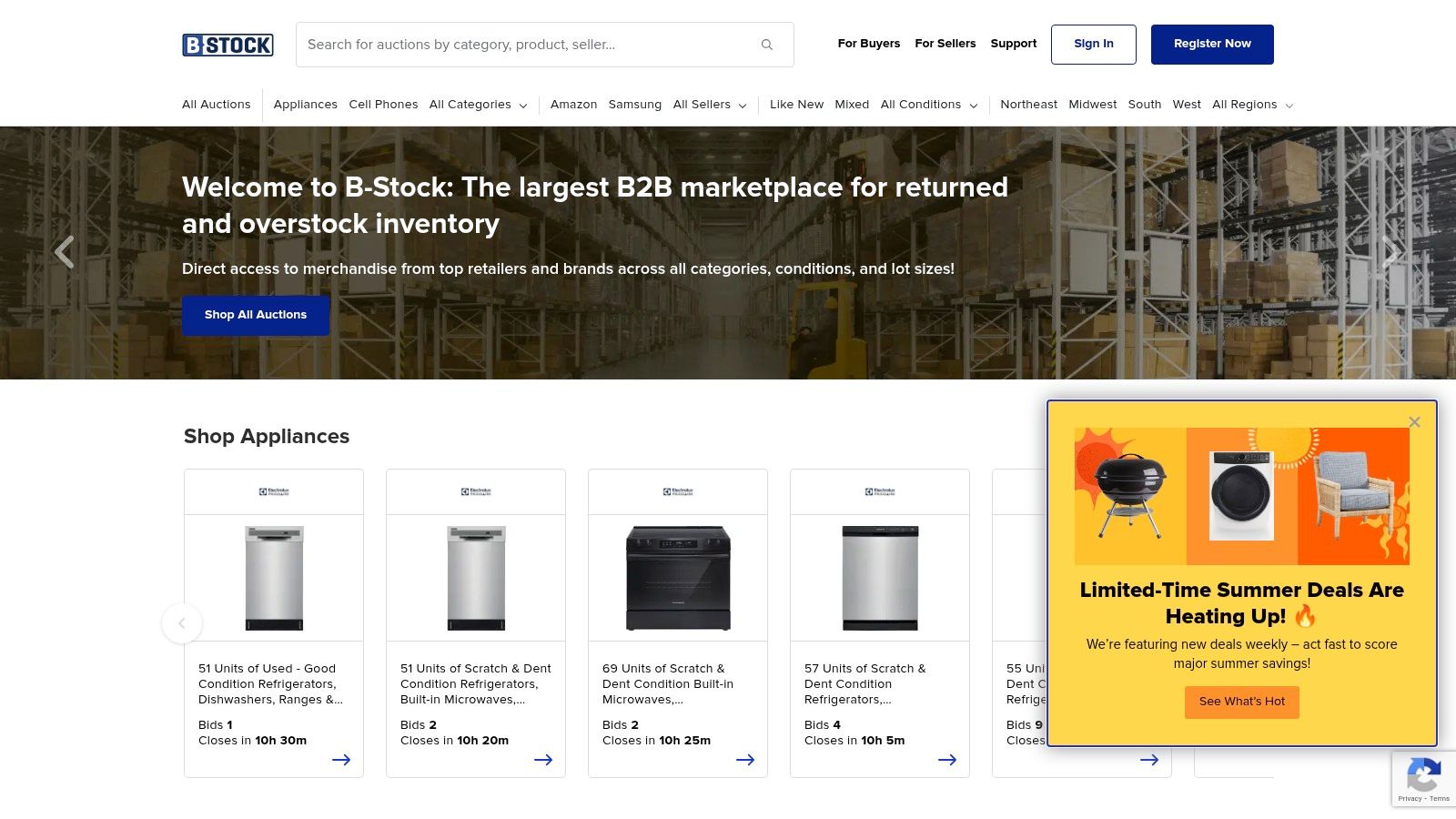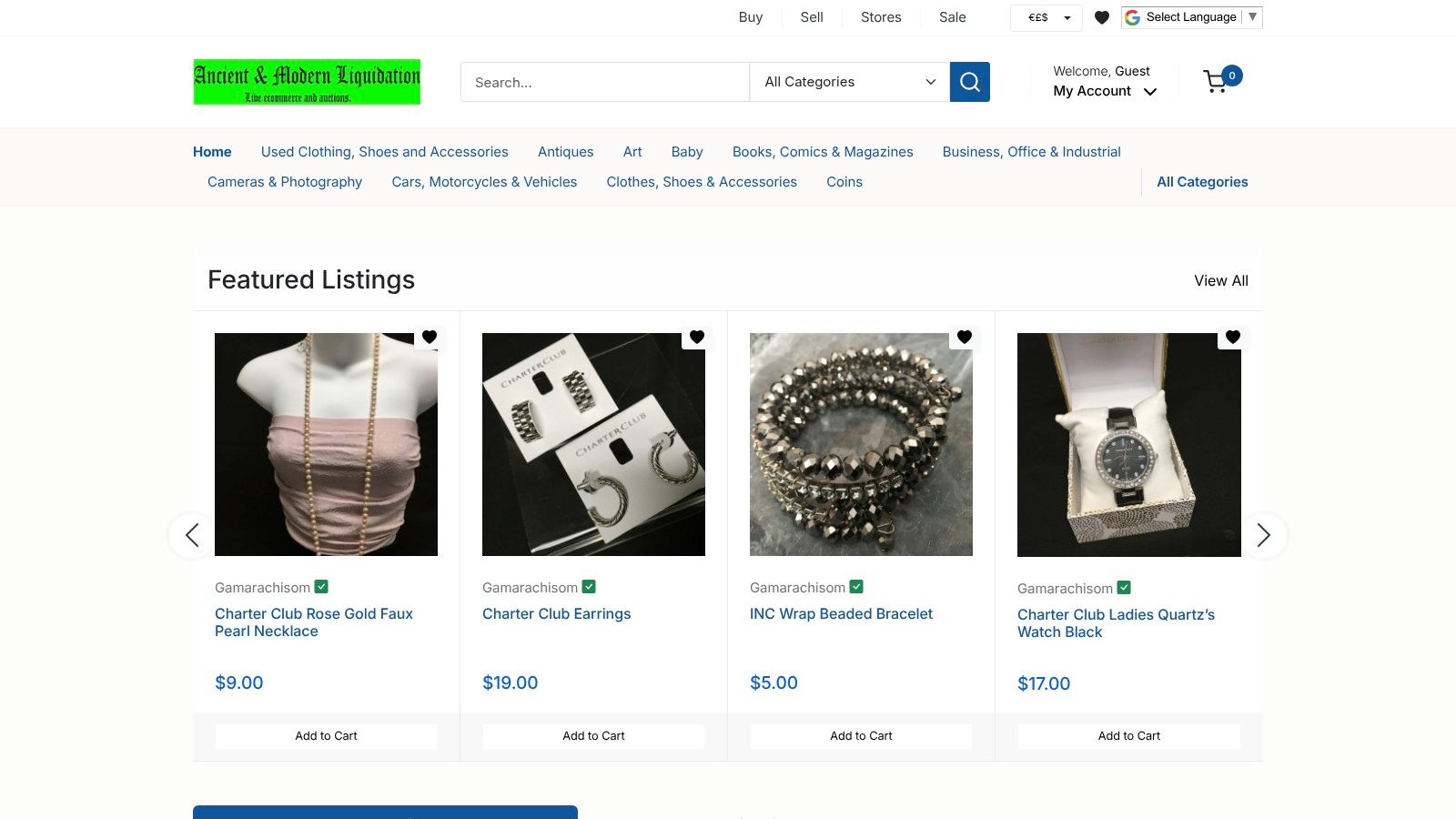Getting burned by unreliable suppliers or mystery pallets? We’ve tested the best liquidation suppliers so you don’t have to risk your money on duds.
Running a bin store, selling on Amazon, or just starting out in the liquidation game?
Our guide breaks down how to find a good liquidation supplier and covers the top wholesale suppliers for resellers nationwide.
Key Takeaways
- Worldly Treasures Liquidators (WTL) leads with protected purchasing and same-day refund policies
- Direct sourcing matters – platforms with retailer partnerships offer better inventory quality
- Know what you’re buying – detailed manifests and condition grades reduce buying risks
- Lot sizes range widely – from single pallets to full truckloads across different suppliers
- Protected payments prevent common liquidation scams and locked funds
Best Liquidation Suppliers in 2025
Not all liquidation suppliers are created equal. Some will help you build a solid business, others will make you regret ever hearing the word “pallet.” Here’s who’s actually worth your time (and money) in 2025.
| Provider | Core Features/Characteristics | User Experience & Quality ★ | Value Proposition 💰 | Target Audience 👥 | Unique Selling Points ✨ |
|---|---|---|---|---|---|
| Worldly Treasures Liquidators 🏆 | Direct-shipped liquidation truckloads, protected purchasing | ★★★★☆ Reliable, real-time updates | 💰 Transparent pricing, protected funds | 👥 Resellers, bin stores, multi-location retailers | ✨ Fund control until shipment, same-day support |
| Liquidation.com | Auction-based marketplace, sourced from major retailers | ★★★★☆ Detailed manifests, grading | 💰 Competitive but bidding can raise price | 👥 Broad resellers and wholesalers | ✨ Weekly auctions, multiple buying options |
| Direct Liquidation | Amazon partner, manifested/unmanifested loads | ★★★★☆ Quality grading & manifests | 💰 Competitive pricing, no buyer’s premium | 👥 Medium-large buyers, Amazon-focused | ✨ Official Amazon liquidation partner |
| 888 Lots | Auction & fixed price, mixed & single-category lots | ★★★☆☆ Variable service | 💰 Flexible pricing options | 👥 Small to mid-size buyers | ✨ Dual marketplace options |
| B-Stock | Private & public auctions, authentication services | ★★★★☆ Brand authentication | 💰 Premium access, exclusive marketplaces | 👥 Established buyers, brand-focused | ✨ Invite-only marketplaces, authentication |
| Via Trading | Physical warehouses, online & offline purchasing | ★★★☆☆ In-person inspection option | 💰 Convenience premium, immediate access | 👥 Buyers preferring inspection, USA-based | ✨ Warehouse inspection, immediate availability |
| American Merchandise Liquidators (AML) | General merchandise, electronics, seasonal items | ★★★★☆ Consistent quality | 💰 Competitive bulk pricing | 👥 Bulk buyers focused on specific categories | ✨ Seasonal & holiday inventory |
1. 🏆 Top Supplier: Worldly Treasures Liquidators (WTL)
Worldly Treasures Liquidators has built its reputation on solving the biggest problems in wholesale liquidation: unreliable suppliers, locked funds, and poor customer support.
They connect resellers, bin store owners, and multi-location retailers to premium liquidation truckloads and pallets sourced directly from major U.S. retailers and big-box stores.
Who It’s For: WTL specializes in serving serious buyers who need reliability over rock-bottom prices. Clients include scaling resellers, burned switchers looking for a trustworthy alternative, and businesses that value transparent dealings over mystery lots.
Best Features
- Same-day refund policy – Get your money back immediately if shipments don’t meet expectations
- Verified manifests with flagged unknowns – Know exactly what you’re buying, including potential problem items
- Fast shipping with real-time inventory – Access fresh stock as it becomes available
- Real human support – Same-day communication from actual liquidation experts, not chatbots
✔ Best For
- Scaling resellers who need consistent, quality inventory
- Burned switchers tired of unreliable suppliers and locked funds
- Buyers who value trust and transparency over the lowest possible prices
- Multi-location retailers requiring verified inventory for multiple stores
✖ Drawbacks
- Pricing available by request only (no public price lists)
- Not ideal for single-item buyers or those testing the waters with small orders
- Focus on larger volume purchases (pallets and truckloads)
Bottom Line WTL has earned trust from 500+ buyers who report 30-40% profit margins by prioritizing buyer protection over cheap prices.
Their protected purchasing system eliminates the risk of no-show truckloads, while their verified manifests reduce the guesswork that kills margins.
Request Pricing & Availability →
2. Liquidation.com
The granddaddy of liquidation auctions, connecting buyers with overstock and returns from major retailers like Target, Walmart, and Amazon for over 20 years.
Their auction-based model means you’re competing with other buyers, but it also means you can sometimes snag incredible deals if you know what you’re doing.
Best For
- Experienced bidders who know how to spot undervalued lots
- Businesses comfortable with competitive auction environments
- Buyers seeking variety across multiple product categories
- Resellers who can handle membership fees and minimum purchases
✔ Pros
- Detailed manifests with condition grades for every lot
- Direct relationships with major retailers ensure authentic merchandise
- Flexible lot sizes from individual items to full truckloads
- Transparent grading system reduces purchase risks
✖ Cons
- Competitive bidding can drive prices above retail
- Membership fees are required for platform access
- Limited return policy on liquidated goods
3. Direct Liquidation
Direct Liquidation holds the golden ticket in wholesale liquidation; they’re Amazon’s official liquidation partner. This privileged position gives them first access to returned and overstocked merchandise from the world’s largest online retailer and others.
They’ve built their platform around serving serious buyers who want authentic merchandise with detailed documentation. They offer both manifested loads (where you know exactly what’s inside) and mystery loads for the more adventurous.
Best For
- Amazon FBA sellers looking for authentic returned merchandise
- Medium to large-scale buyers comfortable with pallet/truckload minimums
- Businesses prioritizing product authenticity over rock-bottom prices
- Experienced liquidators who understand grading systems
✔ Pros
- Official Amazon partnership ensures authentic, high-quality inventory
- Detailed condition grades (A, B, C, D) and manifests for informed buying
- No buyer’s premiums – what you bid is what you pay
- Regular inventory updates across electronics, home goods, and fashion
✖ Cons
- High competition drives up prices on premium lots
- Account approval process can be lengthy for new buyers
- Focuses on larger quantities may not suit smaller operations
4. 888 Lots
888 Lots tries to give you the best of both worlds – auction excitement and fixed-price convenience all in one platform.
They specialize in mixed category pallets and truckloads from various retailers, making them a decent option for resellers who like variety and don’t mind a bit of mystery in their purchases.
While they’re not as polished as the industry giants, they’ve carved out a niche by being more accessible to smaller buyers and offering detailed manifests that actually tell you what you’re getting (most of the time).
Best For
- Small to mid-size buyers testing the liquidation waters
- Resellers who prefer variety over specialized categories
- Buyers who want both auction and fixed-price options
✔ Pros
- Dual marketplace offers auction and buy-now options
- Comprehensive lot manifests with item counts and conditions
- Flexible lot sizes from single pallets to full truckloads
- More accessible entry point than larger platforms
✖ Cons
- Smaller inventory selection compared to industry leaders
- Variable customer service quality reported by users
- Limited brand recognition and shorter track record
5. B-Stock
B-Stock operates like the VIP club of liquidation, running private marketplaces where major retailers and manufacturers sell their excess inventory directly to pre-approved buyers.
While anyone can access their public auctions, the real gold is in their invitation-only private marketplaces, where brands like major electronics retailers liquidate returned TVs and appliances to buyers they trust.
Best For
- Established buyers with proven track records
- Businesses focused on specific brand-name products
- Buyers prioritizing authenticity and product verification
- Large-scale operations comfortable with invite-only access
✔ Pros
- Direct access to major brand liquidation marketplaces
- Authentication services reduce counterfeit risks
- Detailed condition reports with photos for accurate assessment
- Both public and exclusive private auction options
✖ Cons
- Invitation-only access creates barriers for new buyers
- High competition in exclusive marketplaces
- Complex approval process requiring business documentation
6. Via Trading
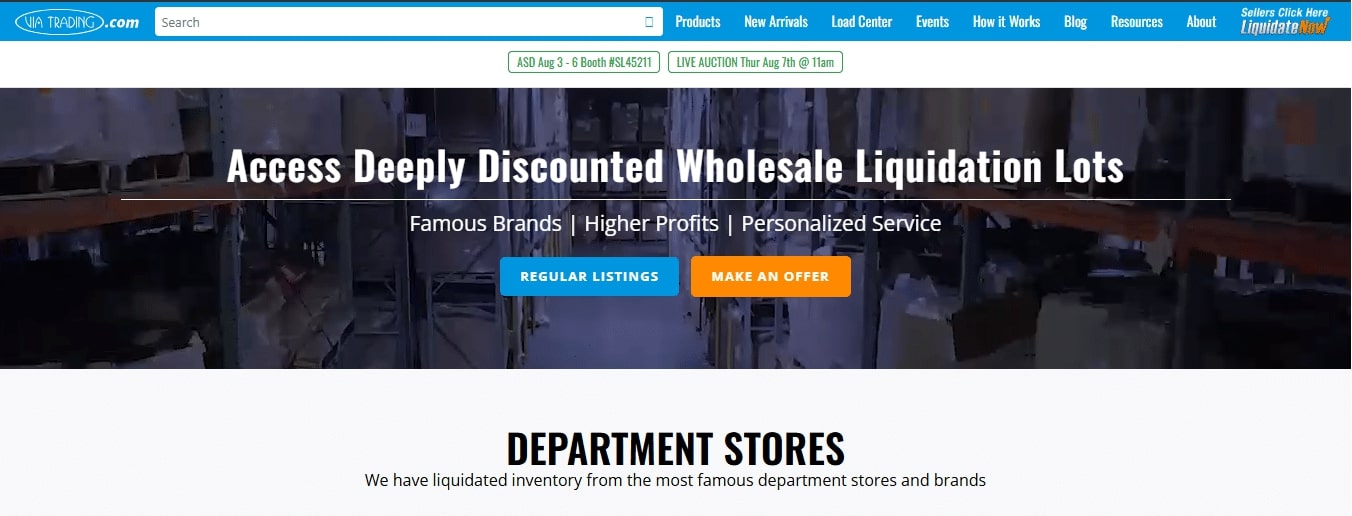
Via Trading takes a refreshingly old-school approach; they actually let you touch the merchandise before you buy it. With physical warehouses scattered across the US, they’re perfect for buyers who’ve been burned by “photo looked great online” disappointments.
Instead of playing auction games, they buy directly from retailers and manufacturers, then flip the inventory at fixed prices.
It’s more expensive than auction sites, but you’re paying for convenience, speed, and the ability to inspect a pallet before loading it on your truck.
You can browse and buy online like any other platform, but if you’re nearby one of their warehouses, you can actually touch and inspect pallets before purchasing – a rare luxury in the liquidation world.
Best For
- Buyers who prefer hands-on inspection before purchasing
- Businesses needing immediate inventory without bidding delays
- US-based operations with access to their warehouse locations
✔ Pros
- Hybrid model offers both online and physical purchases
- Warehouse inspection eliminates buying surprises
- Immediate inventory availability without auction waiting
- Both mixed and sorted lots available
✖ Cons
- Higher prices reflect a convenience premium
- Geographic limitations for warehouse access
- Smaller online inventory compared to auction platforms
7. American Merchandise Liquidators (AML)
AML keeps things simple and focused, specializing in general merchandise, electronics, home goods, and seasonal items without trying to be everything to everyone.
While they don’t have the flashy websites or massive inventory of the big players, they’ve built a solid reputation by consistently delivering mid-range merchandise that actually matches their manifests.
AMLS is known for its seasonal and holiday inventory, making it a go-to for retailers who need to stock up for specific selling seasons. Think of them as the reliable workhorse of liquidation suppliers.
Best For
- Bulk buyers focused on general merchandise categories
- Seasonal retailers after holiday and themed inventory
- Businesses prioritizing consistent quality over variety
- Resellers who value responsive customer service
✔ Pros
- Specialized focus ensures consistent quality control
- Strong seasonal and holiday inventory selection
- Detailed manifests with accurate condition grades
- Responsive customer support team
✖ Cons
- Limited product range compared to larger platforms
- Minimum order requirements may challenge smaller buyers
- Less brand variety than generalist competitors
How to Find a Good Liquidation Supplier
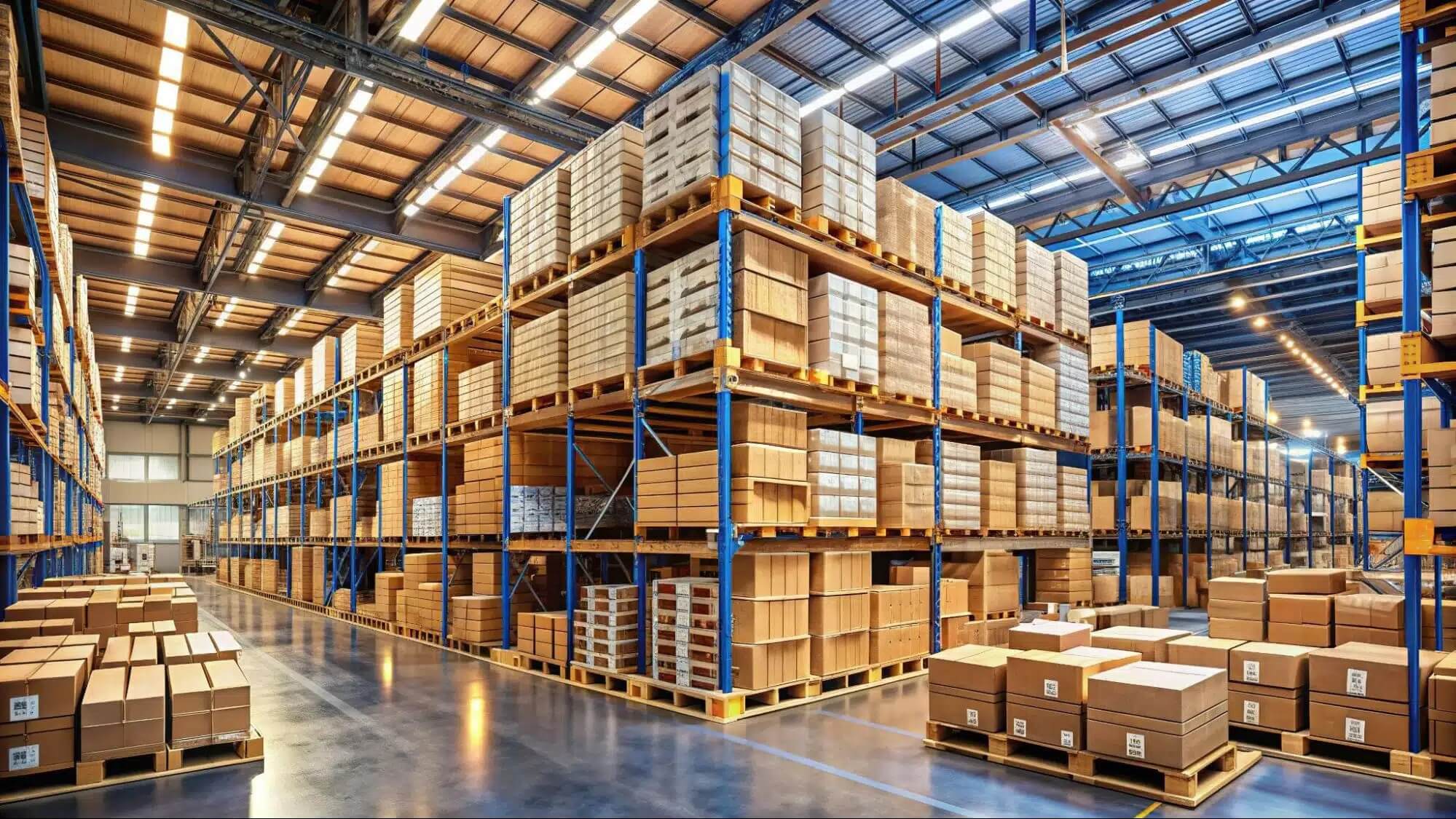
Sure, we all love cheap deals. However, finding reliable wholesale liquidation suppliers and building partnerships that won’t leave you stuck with worthless inventory or, worse, empty-handed after wiring money to scammers is just as important.
Here’s what separates the legitimate suppliers from the fly-by-night operations that plague this industry.
Start with Financial Protection
The biggest red flag in liquidation is suppliers who demand full payment up front with no protection for buyers. Legitimate suppliers understand that trust works both ways.
Look for platforms that offer buyer protection, escrow services, or payment systems where you retain control of your funds until the merchandise is actually shipped.
Some suppliers, like Worldly Treasures Liquidators, have built their entire business model around protecting buyers. We don’t release your payment until your truckload is confirmed shipped and on its way.
Demand Transparency in Manifests
Mystery pallets might sound exciting, but they’re profit killers.
Professional liquidation suppliers provide detailed manifests showing exactly what’s in each lot, including condition grades and item counts.
The best suppliers go further – they’ll flag items that might be problematic or unknown quantities so you’re not surprised by useless inventory.
Quality manifests should include:
- Detailed item descriptions and quantities
- Condition grades
- Retail values for accurate margin calculations
- Photos of actual merchandise when possible
- Clear flagging of damaged or unknown items
Verify Direct Sourcing Relationships
The closer your supplier is to the original source, the better your inventory quality and pricing will be. Suppliers with direct relationships to major retailers get first pick of returned merchandise before it gets picked over by middlemen.
Ask potential suppliers about their sourcing relationships – legitimate operations will be transparent about where their inventory comes from.
Test Their Customer Support
Liquidation deals can get complicated fast. Shipments get delayed, manifests have errors, and sometimes you need to resolve issues quickly to protect your business.
Before committing to large orders, test how responsive a supplier’s customer support really is. Call during business hours. Send emails with questions.
See how quickly they respond and whether you’re talking to knowledgeable people or outsourced call centers.
The best liquidation suppliers offer fast communication and have real liquidation experts to answer your questions.
If you can’t get a human on the phone when you need one, imagine trying to resolve a $50,000 truckload problem through an automated system.
Look for Consistent Inventory Flow
Reliable suppliers maintain steady relationships with their sources, ensuring consistent inventory availability. Sporadic suppliers who disappear for weeks or months between offerings aren’t building sustainable partnerships – they’re probably working as middlemen trying to flip whatever deals they can find.
Check Track Records
Look for testimonials from existing buyers, especially those in similar businesses to yours. Established suppliers should have satisfied customers who can speak to their experience.
Look for suppliers who can demonstrate:
- Years in business with verifiable track records
- Hundreds of satisfied buyers
- Documented success stories and case studies
- Industry recognition or partnerships
Understand True Total Costs
Hidden fees kill margins faster than anything else. Before committing to any supplier, get a complete breakdown of all costs involved:
- Base merchandise cost
- Buyer’s premiums or platform fees
- Shipping and handling charges
- Payment processing fees
- Any membership or access fees
The most expensive-looking option might actually be the cheapest once you factor in all the hidden costs that other suppliers tack on.
Start Small and Scale Up
Even with the best due diligence, start with smaller test orders before committing to truckloads. This lets you evaluate the supplier’s actual performance, manifest accuracy, and customer service under real conditions. If they deliver as promised on small orders, you can gradually increase your order sizes with confidence.
🚩 Red Flags to Avoid
Walk away immediately if a supplier:
- Demands wire transfers or cryptocurrency payments
- Won’t provide detailed manifests
- Has no physical address or phone number
- Offers deals that seem too good to be true
- Pressures you to make immediate decisions
- Can’t explain their sourcing relationships clearly
The liquidation industry has legitimate suppliers who’ve built their reputations on buyer success over many years.
By focusing on transparency, protection, and proven track records rather than just lowest prices, you’ll build relationships that drive sustainable profits instead of expensive mistakes.
FAQ
What should I look for in a wholesale liquidation supplier?
Focus on three areas: financial protection (can you get your money back if things go wrong?), manifest transparency (do you know exactly what you’re buying?), and customer support (can you reach real people when issues arise?).
What’s the difference between manifested and unmanifested loads?
Manifested loads come with detailed lists of every item included, letting you calculate potential profits before buying. Unmanifested (or “mystery”) loads are cheaper, but you don’t know their contents until delivery. We advise new buyers to stick with manifested loads until they get to know the business better.
How do I know if a manifest is trustworthy?
Reliable manifests include specific item descriptions, condition grades, retail values, and item quantities. The best suppliers flag problem items or unknowns upfront rather than hiding them.
How do I find the best liquidation suppliers near me?
While location matters for warehouse pickups (Via Trading) or inspections, most reputable suppliers ship nationwide. Focus on supplier quality over proximity. The best liquidation suppliers often aren’t the closest ones.
Can I buy smaller lots, or do I need a full truckload?
Most suppliers offer multiple lot sizes, from single pallets to full truckloads. Start small to test suppliers and understand the business before scaling up. At WT Liquidators, we can supply you with either pallets or truckloads.
What happens if my liquidation order arrives damaged?
This depends on your supplier’s policies. Some offer refunds or replacements for shipping damage, while others consider it your responsibility once items leave their warehouse. Suppliers with buyer-friendly damage policies typically charge slightly more, but in the long run, it’s well worth it.
Choosing the Right Liquidation Supplier for Your Business
The liquidation game isn’t about finding the cheapest pallets but more about finding suppliers who won’t disappear with your money or stick you with garbage inventory.
After testing these platforms, one thing’s clear: the suppliers who invest in buyer protection and transparent processes consistently deliver better results than the “bargain” operations.
Our approach at WTL proves this point perfectly. While other suppliers chase volume with mystery pallets and locked payments, we’ve built our business around keeping buyers happy.
The results speak for themselves. Our buyer base keeps growing, and those 500+ customers aren’t sticking around for charity. When buyers consistently hit 30-40% margins, word spreads fast in an industry where most people are struggling to break even.
So once again, and we can’t reiterate this enough, the biggest takeaway is to pick suppliers based on how they treat buyers, not just their prices.
The cheapest option usually costs the most in the long run. Whether you choose WTL or another supplier from this list, prioritize transparency and protection.
Get Today’s Pallet List from Worldly Treasures Liquidators →

